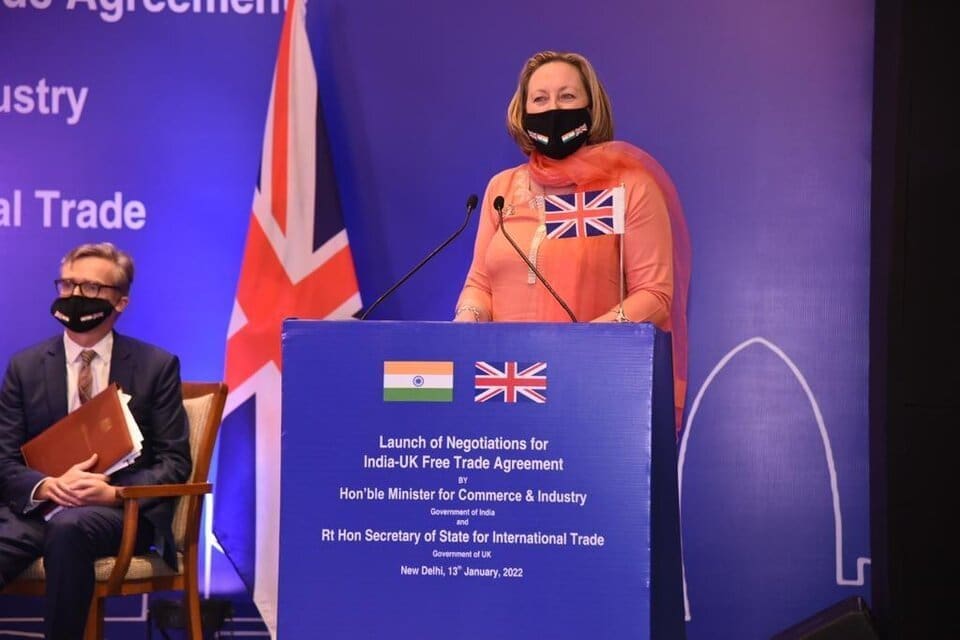The ongoing negotiations for the India-United Kingdom (UK) Free Trade Agreement (FTA) have reached a crucial stage, as both nations edge closer to finalizing the deal.
Several contentious issues, such as intellectual property rights, rules of origin, and a bilateral investment treaty (BIT), have been subjects of intense deliberation. The Ministry of Commerce in India stated during its monthly trade briefing in early October that the talks have progressed significantly, with concerted efforts underway to bridge the gaps.
The focus has notably turned towards dispute settlement, considered the most contentious aspect of the BIT, in order to facilitate its finalization alongside the FTA for goods and services.
The existing India-UK BIT was signed back in 1994 and marked India’s initial encounter with such an agreement. However, following the White Industries case, which involved an alleged violation of the BIT with Australia, India elected to terminate all its BITs with 77 countries, including the UK, in 2016.
Subsequently, the Indian government embarked on revising its model BIT. Although the sunset period for the India-UK BIT is still ongoing, discussions between the two nations have centred around dispute resolution, as investment protection is being negotiated independently of the proposed FTA.
One point of contention has been the inclusion of a clause on exhaustion of local remedies (ELR), which India has advocated for but the UK has been hesitant to accept. Under the ELR clause, an investor is required to pursue its claims within the domestic legal framework and exhaust all available judicial and administrative remedies before resorting to international arbitration.
This clause, regarded as a customary rule of international law, aims to preserve the sovereignty of host states as investment destinations. Scholars like M.C. Porterfiekl have argued that adherence to local remedies fosters the rule of law in such states.
As negotiations between India and the UK progress, the resolution of disagreements around these contentious issues will be crucial for the successful conclusion of the FTA and BIT. Both nations are working towards finding common ground in order to facilitate a mutually beneficial and comprehensive agreement.
Since India has been involved in many investment treaty arbitrations as a respondent, it is understandable that the country is uneasy about investors resorting to international arbitration.
The pursuit of domestic remedies by investors has been criticized for causing delays and escalating costs, as it often takes several years and multiple judicial reviews to reach a final judgment. Critics argue that public proceedings in domestic courts can worsen disputes and impact the investment climate of the host state.
This concern is not unique to India; the UK has also expressed similar reservations. However, ongoing negotiations between the two countries indicate a willingness to reconsider their positions and ensure flexibility. India may step back from its previous approach under the model BIT and potentially drop the requirement of Exhaustion of Local Remedies (ELR) in order to expedite the settlement of investor-state disputes.
Another issue affecting foreign investors is India’s revised definition of ‘investment’ for purposes of BIT protection. The earlier ‘asset’-based definition has been replaced with an ‘enterprise ‘-based one. While both formulations are valid, experts argue that the asset-based definition was broader and covered all kinds of movable and immovable assets, whether or not they contributed to the host country’s development.
The shift towards an enterprise-based approach is intended to limit the scope of protected investments and reduce potential liability for the host state in investor-state dispute settlement claims.
India’s decision to switch definitions was driven by its own experiences with investment disputes. However, policymakers have indicated that concessions may be made on the model BIT, along with adjustments for important trading partners. These adjustments will require boldness, as deviating from the model BIT may present challenges.
Nonetheless, if India and the UK can successfully negotiate a mutually acceptable BIT, it would be a significant achievement for India, especially since the country has not signed any BIT with a major economy since adopting its model BIT.

